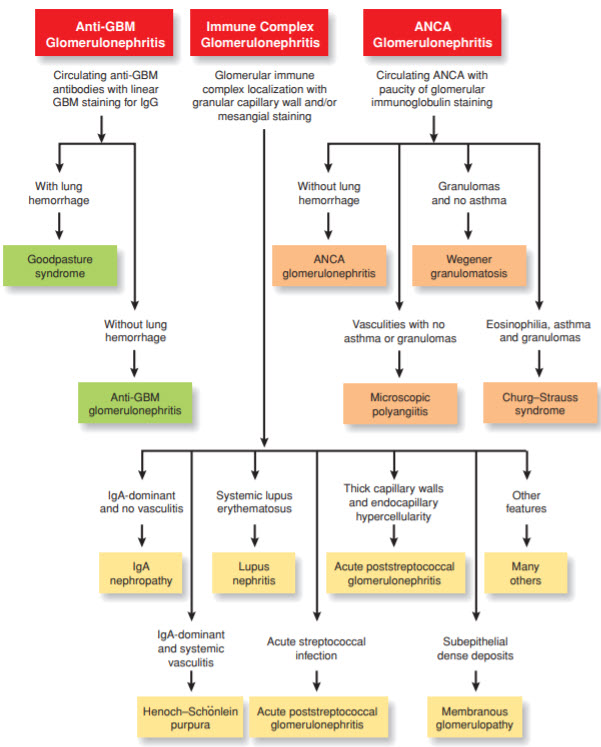Question 8#
A 38-year-old woman presents to her physician with fatigue and edema. She is an IV drug abuser and has been diagnosed with chronic hepatitis C infection. A urinalysis shows 1+ protein, 1+ blood, and red blood cell (RBC) casts. The rest of her laboratory values are shown below.
- Blood urea nitrogen 25 mg/dL
- Creatinine 1.7 mg/dL
- Total protein 6.1 g/dL
- Albumin 3.7 g/dL
- C3 68 mg/dL (normal range 75–175 mg/dL)
- C4 <2 mg/dL (normal range 14–40 mg/dL)
Laboratory testing 2 weeks ago showed a normal creatinine (0.8 mg/dL). A renal biopsy is performed which shows glomerular crescent formation. Antinuclear antibody, antinuclear cytoplasmic antibody, and antiglomerular basement membrane (GBM) antibody testing is negative.
Which of the following is the most likely diagnosis?
A. Granulomatosis with polyangiitisB. Systemic lupus erythematosus (SLE)
C. Membranoproliferative glomerulonephritis
D. IgA nephropathy
E. Goodpasture syndrome
Correct Answer is C
Comment:
Membranoproliferative glomerulonephritis. This patient has a rapidly progressive glomerulonephritis (RPGN) indicated by three things: the rapid decrease in GFR over a short period of time, RBC casts on urinalysis that suggests a glomerulonephritis, and crescent formation on renal biopsy. (A) The most common causes of RPGN are antineutrophil cytoplasmic antibody (ANCA)-positive vasculitides (e.g., granulomatosis with polyangiitis); however, testing for ANCA was negative in this case. (E) Goodpasture syndrome can also cause RPGN, but was ruled out with negative anti-GBM antibodies. Therefore, the cause of this patient’s RPGN is likely immunecomplex mediated, and the next step in diagnosis is looking at serum complement levels. (D) This patient had low complement levels, ruling out causes of RPGN with normal complement levels such as IgA nephropathy and Henoch– Schönlein purpura. (B) SLE can cause RPGN with low complement levels; however, antinuclear antibody (ANA) is a sensitive test and therefore rules this out. Membranoproliferative glomerulonephritis may or may not be associated with cryoglobulins and has a variety of causes, including infections (e.g., HIV, hepatitis C, hepatitis B), collagen vascular diseases (e.g., SLE, rheumatoid arthritis), and monoclonal gammopathies (e.g., multiple myeloma). This patient has chronic hepatitis C infection and this is likely the cause. Below is a helpful overview of the various causes of glomerulonephritis (Figure below).
